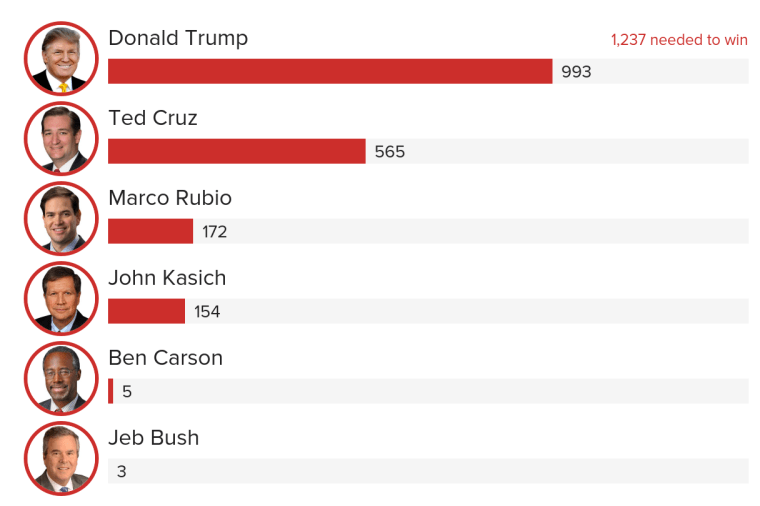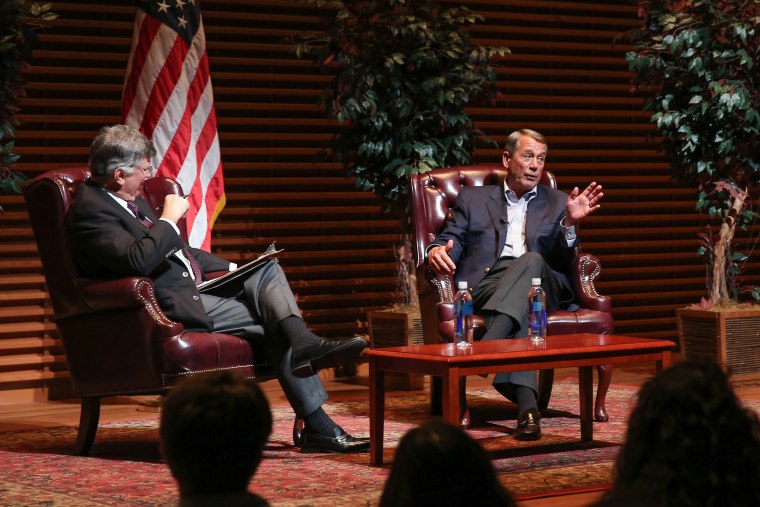First Read is a morning briefing from Meet the Press and the NBC Political Unit on the day's most important political stories and why they matter.
How Boehner-vs.-Cruz reveals why “Stop Trump” has been stopped in its tracks
The back-and-forth over former House Speaker John Boehner’s comments about Ted Cruz -- “Lucifer in the flesh,” “I have never worked with a more miserable son of a bi%&$ in my life” -- demonstrates the shortcomings of the “Stop Trump” movement. Can you beat Trump with someone who’s more reviled among Republican leaders than Trump is? Can you win over John Kasich’s voters in Indiana if you can’t even win over John Boehner? Make no mistake, Boehner’s biting remarks about Cruz are personal; in fact, Boehner isn’t speaker today due in large part to Ted Cruz and his House Freedom Caucus allies. But here is the central challenge for Trump’s opponents: Can you really stop Trump when a good chunk of the party thinks Cruz is a worse alternative? While Boehner’s “Lucifer” and “S.O.B.” comments received more attention, this might have been the most newsworthy part of Boehner’s remarks at Stanford: “While he did not praise Trump’s policies, the former speaker did say he would vote for Trump in the general election if he becomes the Republican nominee. He said he would not, however, vote for Cruz.”
When Bob Corker is praising Trump’s foreign-policy speech, you know the outcome is near
And on the same day that the political community was consuming the Boehner-vs.-Cruz spat, Sen. Bob Corker (R-TN) -- chairman of the Senate Foreign Relations Committee -- praised Trump’s foreign-policy speech from Wednesday. “What I liked about his speech is it challenged the foreign policy establishment here in Washington,” Corker said to NBC’s Andrea Mitchell on MSNBC’s “Andrea Mitchell Reports” yesterday. “Let's face it, has gotten it wrong now for a couple of decades at least. So I liked the fact that he challenged the foreign policy establishment here.” (Think about that: The chairman of the Senate Foreign Relations Committee praising someone for taking on the foreign-policy establishment!) And Corker added that he might change his mind about remaining neutral in the GOP presidential contest. And it’s just not Corker. Here’s the Washington Post: “Throughout the Republican Party, from New Hampshire to Florida to California, many leaders, operatives, donors and activists arrived this week at the conclusion they had been hoping to thwart or at least delay: Donald Trump will be their presidential nominee.”
We’ve already seen a Clinton-vs.-Trump race -- three years ago
Two unpopular candidates. A larger-than-life businessman. A well-known (and controversial) politician. A Republican Party with sky-high negative ratings. Questions about the current White House’s competence. And all in an increasingly diverse and urban place. Are we talking about the emerging Donald Trump-vs.-Hillary general election? Sure, but we’re referring more to the 2013 gubernatorial election in Virginia between Democrat Terry McAuliffe and Republican Ken Cuccinelli, which appears to be a template for this year’s presidential election. McAuliffe won that race three years ago, 48%-45%, with a third-party Libertarian candidate getting 6.5% of the vote. And it’s worth noting how the presidential results in battleground Virginia have mirrored the national results.
- 2008: Virginia (Obama 52.6%, McCain 46.3%), Nationwide (52.9%, 45.6%)
- 2012: Virginia (Obama 51.2%, Romney 47.3%), Nationwide (Obama 51.0%, Romney 47.2%)
How Democrats start out with an electoral-vote advantage
Speaking of Virginia and this year’s general election, it’s time to start taking a look at the emerging 2016 battleground map. And today we start with the electoral-vote baselines for each party :
- Electoral votes in states that have gone Democratic in every election since 2000: 242
- Electoral votes in states that have gone Republican in every election since 2000: 180
Folks, that is a 62-vote advantage for Democrats, which makes getting to 270 electoral votes much, much easier. Then again, some of those states in the Democratic baseline (like Wisconsin) were VERY close in some past elections.
Where the GOP delegate race stands as we approach the weekend
Trump holds a 428-delegate lead over Cruz

Trump needs to win 47% of remaining delegates to reach 1,237 magic number
Cruz needs to win 128% of remaining delegates to reach 1,237 magic number
Kasich needs to win 207% of remaining delegates to reach 1,237 magic number
Where the Democratic delegate race stands
In pledged delegates, Clinton currently holds a lead of 331 delegates with Washington delegates to still be allocated (was 270 before last night)
- Clinton 1,641 (55%)
- Sanders 1,320 (45%)
Clinton must win 35% of remaining pledged delegates to get a majority in pledged delegates
Sanders must win 65% of remaining pledged delegates to get a majority in pledged delegates
In overall delegates (pledged + super), Clinton holds an overall lead of 789 delegates

Clinton must win 19% of remaining delegates to reach 2,383 magic number
Sanders must win 81% of remaining delegates to reach 2,383 magic number
Cruz to appear on “Meet the Press”
Finally, Ted Cruz will be Chuck Todd’s guest on “Meet the Press.”
On the trail
Hillary Clinton delivers the keynote address to the Eagle Academy Foundation breakfast in New York… Bernie Sanders stumps in Indianapolis, IN… Donald Trump and John Kasich speak at the California GOP convention… And Chelsea Clinton campaigns in Indianapolis.



